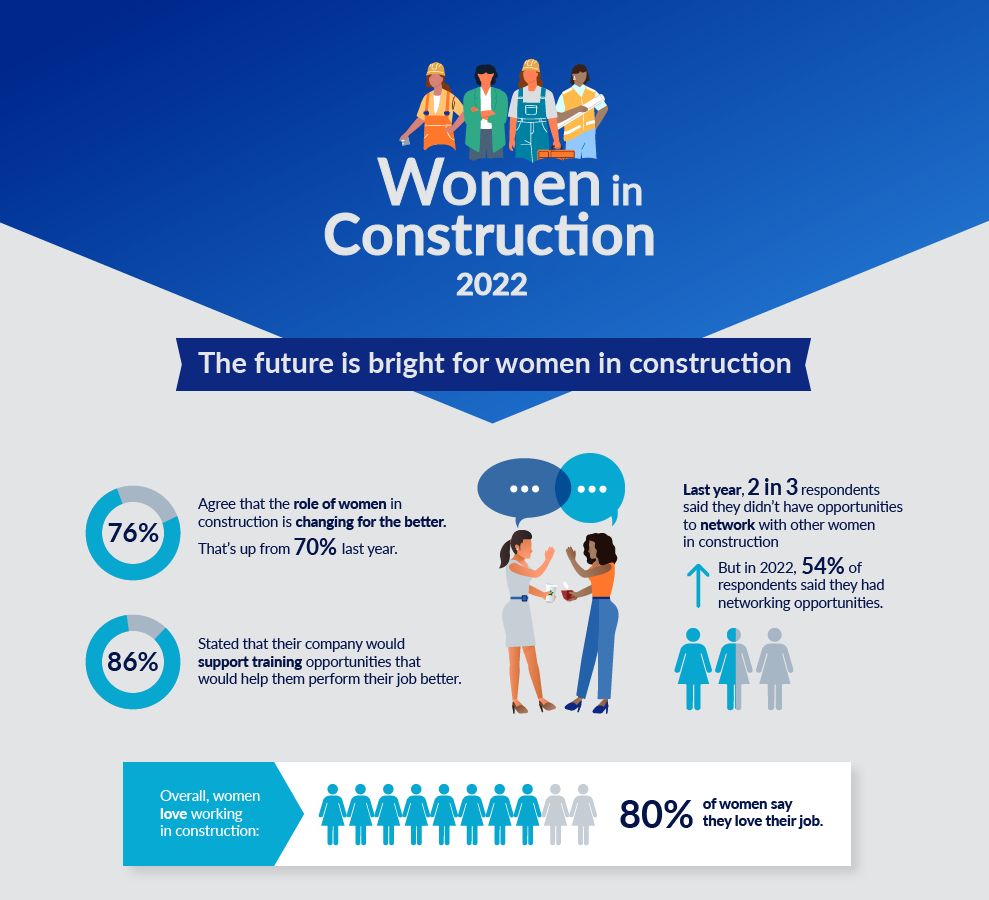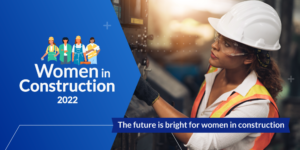
The voices of women in construction are stronger than ever — and growing. While the building industry is traditionally viewed as a male-dominated field and still has a predominantly male workforce, women make up 11% of the construction field — that’s over 1 million workers in a variety of roles.
In a 2022 survey, women across the field — from CEOs, to credit operations, to tradespeople — shared their work experiences and overall job satisfaction working in construction. Overwhelmingly, they enjoy what they do: 80% of women in construction say they love their job. That doesn’t mean they approve of everything about it – women remain split on a variety of issues, from advancement opportunities to the biggest challenges they face in their roles. Here’s what they had to say.
Read the 2021 results: 1,001 women in construction speak out
Who are the women in construction?
Overall, women make up a much smaller share of construction employment — just 11% — than in other industries: Across all sectors, women made up 47% of the US workforce as of 2021.
Half of the survey respondents reported that fewer than 1 in 10 of all employees at their place of work are women. Most respondents work for a general contractor or subcontractor/specialty contractor: 82%.
However, despite the ongoing labor shortage, more young women are entering the construction field. A majority are new to their companies — 57% have worked there under 5 years — and in 2021, only 33% of respondents were under age 45. In 2022, 47% of respondents of women working in construction were under age 45.
While under 2% of women surveyed work in labor, engineering, and tradesperson roles, 10.5% are the president or CEO of their company.
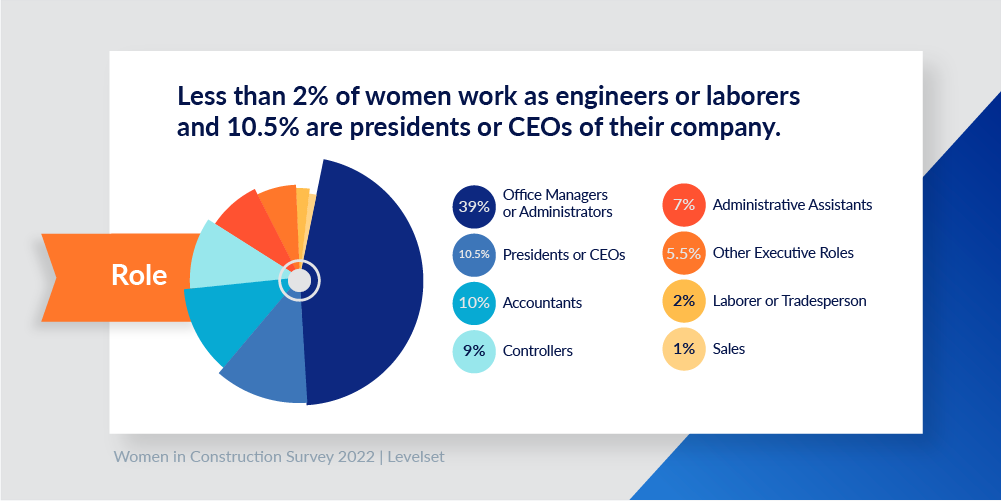
So, why are women drawn to the construction industry? Flexible hours and schedules, opportunities for creativity and problem solving, and taking pride in being a part of the building process are some of the top reasons reported.
“I love being able to see the progress of a construction project from start to finish,” said an engineer working for a North Dakota GC.
Many respondents agreed, with one Oregon controller saying that her favorite part of working in construction is “the variety and ability to contribute to something being built that can positively affect the communities we serve.”
“I get to design a fantasy and bring it to life,” said the President of a Washington General contractor.

Most women see opportunities for advancement & networking
In 2022, 69% of survey respondents said they have the opportunity to advance at their company — that’s an increase from 63% in 2021.
However, there is still not a consensus about the opportunities for women in construction as a whole. 60% agree that there are good opportunities in construction for non-male workers.
“There’s nowhere for me to grow,” commented an accountant for a GC in Georgia about opportunities at her job.
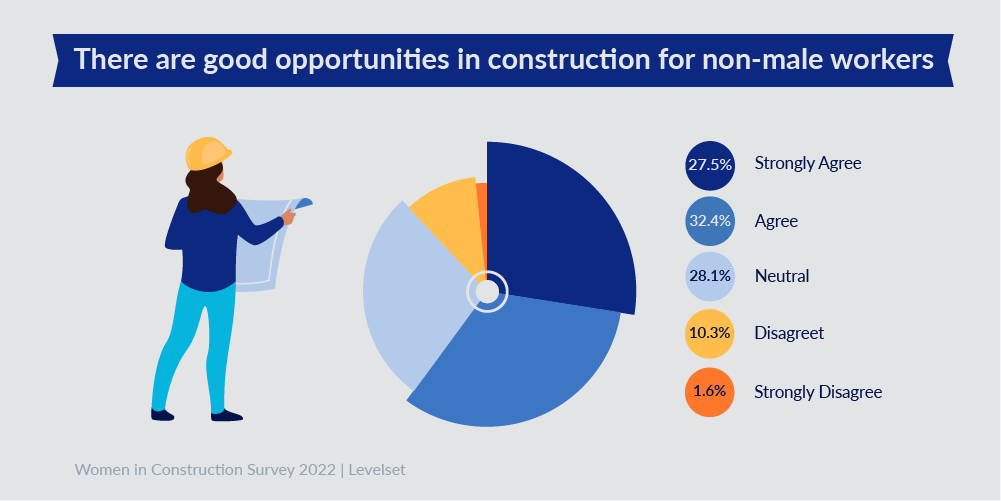
“Overall, I believe that women are often relegated to strictly administrative or accounting positions within the industry,” said a controller for a GC in Oregon. “In my experience, women who are able to break through on the production side have a significant impact that makes a company stronger and more adaptable to the needs of their clients.”
“Women are more inclined to try to build a bridge of cooperation between management, operations, and field than men in my opinion,” she continued.
“Take advantage of learning opportunities and find a woman who can mentor you.”
President, Montana General Contractor
Despite some setbacks, respondents seem optimistic about future opportunities — and underline the importance of finding other women in the industry for mentorships and support systems.
Last year, 2 in 3 respondents said they didn’t have opportunities to network with other women in construction — but in 2022, 54% of respondents said they had networking opportunities.
A project manager for a general contractor in Colorado said that, while she faces difficulty with her male counterparts, she has lots of support. “Sometimes it is discouraging — but I have female mentors, one who owns a construction company and one who owns her own architecture firm,” she said. “I would consider myself lucky.”
Of those who responded to the survey, 23 women mentioned finding and/or having a mentor as being a key piece of advice when starting out or growing their careers in construction.
“Take advantage of learning opportunities and find a woman who can mentor you,” said the President of a GC in Montana.
One positive outlook when it comes to learning: 86% stated that their company would support training opportunities that would help them perform their job better.
Women remain split on the pay gap in construction
The wage gap between men and women across the US affects all industries. According to the Bureau of Labor Statistics, the pay gap between men and women in construction is the lowest of any US industry, with women earning about 99.1% of their male counterparts’ salaries.
However, only 54% of survey respondents said they agreed that men and women are paid equally to do the same work at their job.
“It seems like the women have a bigger workload with less pay than the men in our company,” said an administrative assistant for a subcontractor in Arizona.
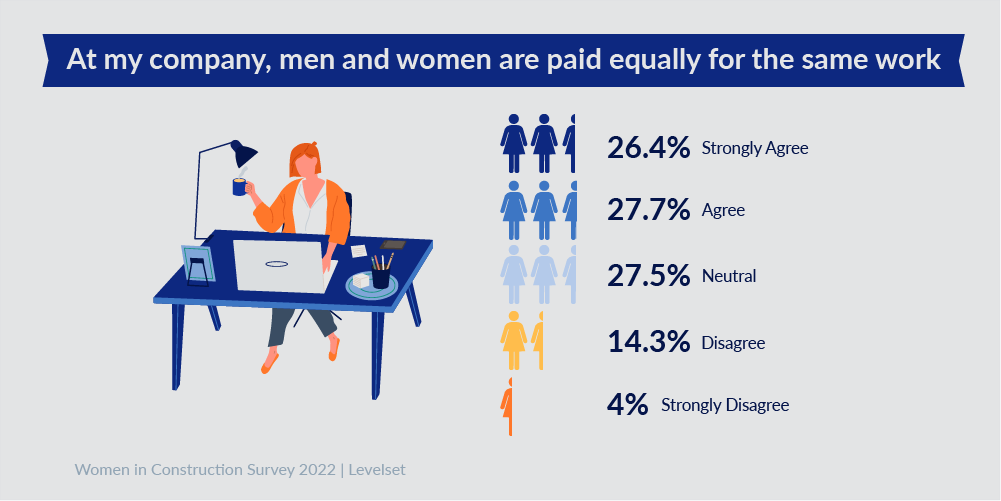
While the gender wage gap affects construction as much as any field, the pay gap can also depend on a variety of factors including location, job title, and previous experience.
”Construction workers earn different wages, depending on their craft, on whether they are apprentices or journey workers, and on location,” said construction labor expert Peter Philips, an economics professor at the University of Utah.
“So if you look at Maryland versus California versus Iowa, and if you look at different wages by segment — industrial, heavy commercial, light commercial, residential, retrofit, and remodeling — you get different wages along those different dimensions. Within those dimensions, it usually doesn’t matter if you’re a male or a female or a wooden post.”
While these other factors may play a role, that has not stopped women from feeling like their gender absolutely affects the way they’re paid and treated.
“No matter how much experience, background, training, or education you have in the field the male counterparts do not think a female is capable of understanding the construction industry,” said a project manager for a GC in Texas.
“Men think I don’t know what I am talking about after my 30 years experience,” added a controller for a subcontractor.
One office administrator for a material supplier in Missouri cited the lack of equal pay for women as their least favorite thing about working in construction.
“There is still so much discrimination within the industry,” said a specialist for a subcontractor in Alaska. “I have had female roofers come in and absolutely out-perform others, and they still get treated differently. In the office, I still see wage gaps.”
“No matter how much experience, background, training, or education you have in the field the male counterparts do not think a female is capable of understanding the construction industry.”
Project Manager, Texas General Contractor
Women report feeling valued overall — but not always heard
85% of respondents say their coworkers are respectful towards women, and 79% responded that they feel respected and valued as much as their coworkers. This is great news — but many respondents wrote in that they still don’t feel like they’re taken seriously.
One dynamic commented on by multiple respondents was the difference in how younger women are treated, especially by their older male coworkers and superiors.
“Being a young woman in construction is unfortunately still a bit of a struggle sometimes,” said a specialist for a general contractor in Minnesota. “I feel like I have to work twice as hard to be taken seriously than my male colleagues.”
“I take great care to document everything so I have proof of my accomplishments, ideas, and hard work — otherwise I’m just taken for granted or credit is handed elsewhere, usually to my male coworkers. It’s also frustrating to literally be the expert in the room at my specific job and have people turn to a male colleague either first to ask a question, or after me to clarify what I’ve just said.”
One director for a GC in Oklahoma cited her least favorite things about working in construction as the lack of respect she sees in the office and “battling with old mindsets” from her male coworkers.
“I cannot tell you how many times my male subordinates have immediately been seen and addressed as my superior by new employees, clients, etc. simply because I am the only female on site — and therefore in their minds, I couldn’t possibly be the person in charge and must just be an admin to take notes for the ‘men’ in charge,” she said.
Some women still frustrated by ‘good old boys’ mentality
50% of respondents reported experiencing some kind of discrimination during their careers — and many are still struggling with inappropriate comments and harassment at work.
1 in every 4 women reported receiving inappropriate comments or unwanted attention from coworkers or supervisors at their workplace — and while 40% say it only happens rarely, 60% report it happens occasionally or even regularly.
Respondents said if they were to receive unwanted attention, 68% would feel comfortable addressing or stopping it themselves, and 83% said their supervisors would support them if they reported it.
The difference in treatment between younger female and older male employees was also evident in many women’s responses about workplace incidents. Multiple respondents cited a version of the “Good Old Boys’ Club” mentality as their least favorite part of construction and a factor in how they’re treated on the job.
“[There is] the old-school mentality of some of our older subcontractors. Sometimes there are comments made about women or LGBTQ+ people that make me uncomfortable,” said an office administrator for a GC in North Carolina.
“I would like to point out that most of my issues with sexual harassment, sexism, and misogyny have been from the older generation of males,” said a director for a GC. “Normally when I receive this type of behavior from a younger-generation male, it is because they feel intimidated by me or that I am jeopardizing their current position. The older generation typically shows this type of behavior without warning — when they are feeling comfortable around you, or want to intimidate you into submission.”
Some women prefer working with men
Despite the reservations and frustrations women have about working in a male-dominated industry, many women in construction reported being drawn to the industry because of that factor.
An accountant for a subcontractor in South Carolina enjoys her job in construction and prefers working with men.
“I don’t have to be around a bunch of women that are catty and stab you in the back because they have nothing better to do,” she said. “Construction will keep you busy 24/7 — you don’t have time for that crap. And men normally don’t want to talk about you or spread rumors.”
Multiple respondents cite that they enjoyed construction because it had less “drama” in the workplace.
“Construction does not have a lot of drama in it,” commented an account for a Minnesota material supplier. “I find working with men there is less drama.”
“I like the guys I work with. They crack me up,” added a controller for a Wisconsin sub.
Women challenged by payment, delays, and more
Many of the challenges cited by respondents affect the entire construction industry regardless of gender. Women in construction noted numerous problems with payments, paperwork, and cash flow – in other words, the essential ingredients of a profitable construction business.
While problems with payments and cash flow affect everyone in the industry, women frequently bear the responsibility for handling them. Of the 1.2 million women working in the construction field, more than one-third work in office and administrative support roles according to the Bureau of Labor Statistics.
Many of our respondents working as credit specialists, controllers, bookkeepers, or administrators highlighted the stress associated with payment problems in the industry.
“Cash flow on the bookkeeping side can be stressful,” said one office administrator for an Oklahoma-based subcontractor. “Sometimes we don’t know if the bills are going to get paid on time that month.”
A host of other women in construction echoed a series of similar complaints: “Complications in insurance claims that delay payment,” “Payment turnaround,” “Payment issues,” and “Late payments.”
Many other vital tasks that lead to a successful project fall on the shoulders of women, who in turn have to deal with a variety of stakeholders and setbacks. Dealing with shortages, city officials, and weather delays can lead to a variety of difficulties.
An office administrator working for a subcontractor in Florida reported frustrations with “taking so long to get a permit, when some cities and or states don’t even require them.” Meanwhile, the controller for a restoration contractor in New York said, “I think some customers believe we can control the weather!” All of these problems, as well as the “cost of materials and product unavailability” reported by a California-based office administrator, can lead to tough conversations with customers.
“[I deal with the] unrealistic expectations of customers [regarding] deadlines or pricing,” voiced a project manager in Wisconsin, “[which] don’t line up with the real world delays or job costs.”
Overall, the hundreds of thousands of women working behind the scenes in construction are pushing through to keep projects moving despite difficulties with payments, delays, and shortages.
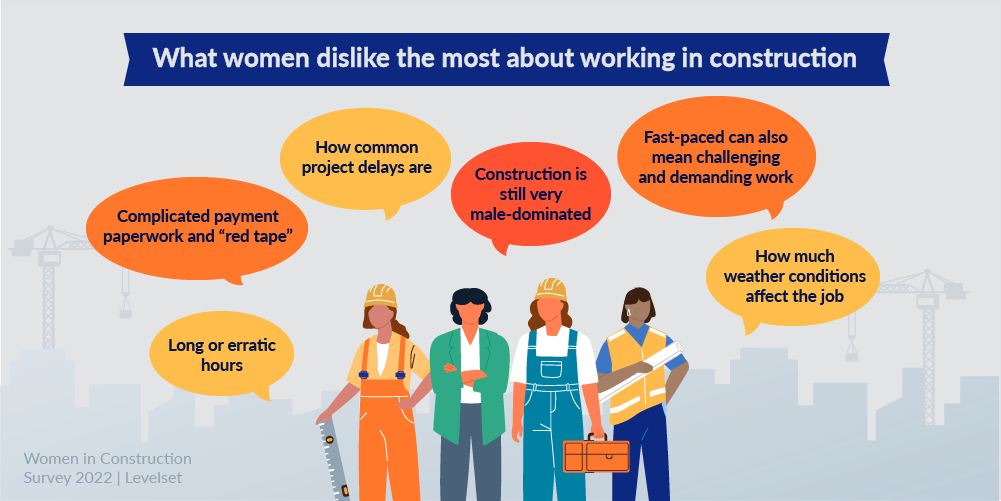
The future is bright for women in construction
Overall, women love working in construction: 80% of women say they love their job.
Not only that, but 76% agree that the role of women in construction is changing for the better — that’s up from 70% last year.
“I think this is an extremely rewarding industry to work in and it’s definitely changing for the better, said a specialist for a GC in Minnesota. “There are endless opportunities for growth and improvement, and women are slowly shaping that much-needed improvement in an industry that was previously dominated by men.”
“You have to have thick skin and a shiny steel backbone to be a woman in a construction supervisory role — but it is so worth it.,” said an office administrator for a Utah subcontractor.
“I have found that the most successful people in our company year over year are the women in their different positions,” said a woman in sales for a GC in Kentucky. “There is nothing a woman can not do in this industry. You deserve to take up just as much space as the men.”
Infographic: 2022 Women in Construction Survey Results

